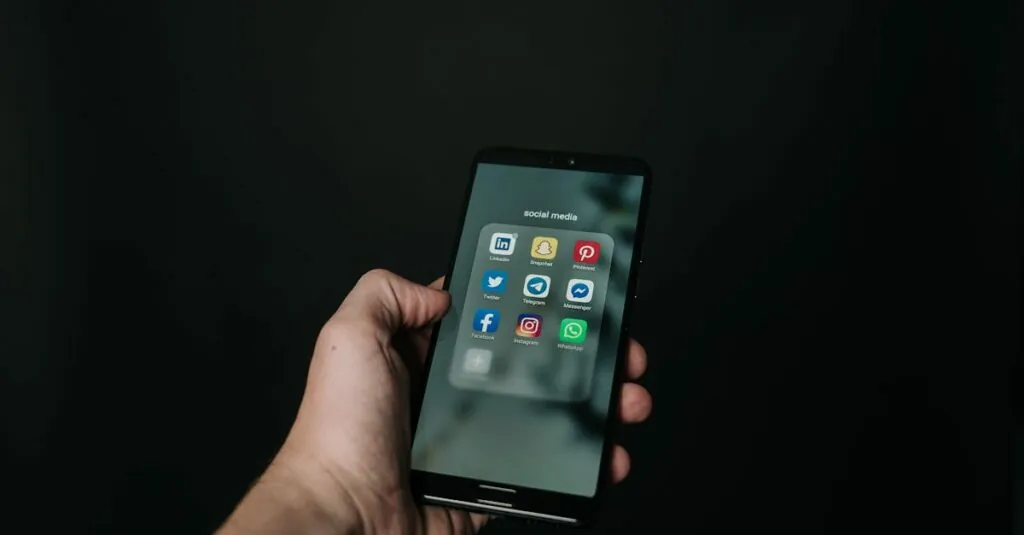Table of Contents
ToggleIn today’s fast-paced world, college life can feel like juggling flaming swords while riding a unicycle. Enter mobile apps—your trusty sidekick in navigating the chaos of campus life. From managing schedules to finding study buddies, these digital tools are here to save the day (and your GPA).
Imagine having everything you need at your fingertips. Need to locate the nearest coffee shop for your caffeine fix? There’s an app for that. Want to connect with classmates for a last-minute group project? Yep, there’s an app for that too. Mobile apps for colleges aren’t just a trend—they’re a game changer, making student life easier, more organized, and maybe even a little more fun. Let’s dive into the must-have apps that can transform the way students tackle their academic adventures.
Overview of Mobile Apps for Colleges
Mobile apps play a crucial role in modern college experiences. They provide tools for managing daily responsibilities and enhancing engagement among students. Various types of apps exist, each catering to specific aspects of college life.
Scheduling apps assist in organizing classes, assignments, and extracurricular activities. For instance, students can easily sync their calendars with course schedules, ensuring they meet deadlines. Communication apps foster connections between peers and faculty, promoting collaboration through instant messaging and video calls.
Resource discovery apps guide users to essential campus services and amenities. Examples include locating study spots, libraries, and even dining facilities. With user reviews and ratings, students can make informed decisions on where to study or grab a meal.
Academic performance apps track progress and offer insights into study habits. They provide analytics on assignments and grades, helping students identify areas needing improvement. Such transparency encourages proactive approaches to academics.
Wellness apps support mental health and stress management. These applications often feature guided meditations and tools for tracking mood. By using these resources, students can foster a healthier work-life balance.
These mobile applications streamline myriad aspects of college life, making experiences more efficient and enjoyable. Each category contributes to helping students navigate their educational journeys with ease.
Benefits of Using Mobile Apps in Higher Education
Mobile apps offer numerous advantages that significantly enhance the college experience for students. These tools foster organization, communication, and access to essential resources.
Increased Accessibility for Students
Accessibility improves for students through mobile apps. Many applications provide crucial information at any time, allowing users to stay updated on schedules and deadlines. Students can receive notifications for important academic events directly on their devices. Resources like e-books, lecture notes, and research materials become easily accessible through various platforms. Moreover, mobile apps enable students with disabilities to use assistive technologies, increasing overall engagement in academic activities.
Enhanced Communication Channels
Communication channels strengthen through mobile apps. Instant messaging and video calling features connect students with peers and faculty, making collaboration seamless. Groups can form to support study sessions and share resources efficiently. Faculty members can reach out to students quickly, providing timely feedback and guidance. Additionally, announcements and updates related to academic life reach students instantly, ensuring no one misses critical information. Enhanced interaction cultivates a supportive academic community, fostering an environment conducive to success.
Popular Mobile Apps for Colleges
Various mobile apps enhance the college experience significantly, catering to academic and campus life needs. Students can benefit from tools designed for managing assignments, communicating, and exploring campus resources efficiently.
Learning Management Systems
Learning management systems serve as essential platforms for academic success. Apps like Blackboard and Canvas allow students to access course materials, submit assignments, and track grades. Through these platforms, instructors can communicate crucial information, fostering greater engagement. Notifications keep students updated on deadlines, new content, and grades, promoting a proactive academic mindset. Integrating these apps streamlines the learning process, creating a more organized educational environment.
Campus Life and Event Apps
Campus life and event apps enhance opportunities for socializing and involvement. Platforms such as Eventbrite or local university-specific apps provide students with information on activities, workshops, and networking events. Users can RSVP for events and engage with peers, bolstering a sense of community. Students can discover clubs, organizations, and recreational activities, enriching their college experience. Keeping students informed about campus happenings ensures they never miss an opportunity to connect and participate.
Evaluating the Effectiveness of Mobile Apps
Assessment of mobile apps in college settings relies on various factors, including user engagement, functionality, and academic impact. Metrics such as download rates, active user numbers, and session lengths provide valuable insights into how students interact with these applications.
Feedback from users plays an essential role in understanding overall effectiveness. Surveys capturing student experiences can reveal which features students find most valuable, like schedule synchronization, communication tools, or resource accessibility. Continuous updates based on user suggestions ensure apps remain relevant and effective in meeting student needs.
Academic performance offers another crucial measure. A study on student outcomes can demonstrate whether utilizing mobile apps directly correlates with improvements in grades and time management. Data-driven analysis helps institutions gauge how mobile apps contribute to student success, making adjustments as necessary to enhance performance.
User retention rates also provide a clear view of app effectiveness. Higher retention suggests that students find these tools beneficial and easy to use. Conversely, low retention may indicate design flaws or a lack of essential features.
Finally, institutions can track overall student satisfaction through metrics linked to campus engagement. Effective mobile apps foster connections among students and faculty while maintaining accessibility to critical resources. Apps that enhance community engagement and streamline academic workflows ultimately show greater effectiveness in supporting students’ college experiences.
Incorporating these evaluation methods ensures that mobile apps continue to adapt and provide the best possible support for students throughout their academic journeys.
Future Trends in Mobile Apps for Colleges
Emerging technologies profoundly influence the development of mobile apps for colleges. Artificial intelligence, for instance, enhances personalized learning experiences. Students benefit from tailored recommendations based on their academic performance and learning preferences.
Integration of augmented reality transforms the way students engage with campus resources. Through AR, users can navigate large campuses, locate classrooms, or find study areas with ease. Enhanced engagement through interactive campus tours appeals to prospective students as well.
Data analytics plays a crucial role in shaping app functionality. Institutions actively track user behavior to refine features, ensuring they align with student needs. Comprehensive insights from analytics allow colleges to create intuitive interfaces that foster seamless user experiences.
Mobile apps increasingly focus on wellness and mental health. Features such as virtual therapy sessions and community forums make it easier for students to access support. Initiatives aimed at promoting mental well-being are becoming essential components of college life.
Blockchain technology also emerges as a significant trend. Its implementation in mobile apps enables secure transactions and verifiable credentials. By facilitating streamlined processes like transcript sharing, blockchain enhances the efficiency of administrative tasks.
Gamification strategies gain traction in educational apps. Incorporating elements of game design motivates students to engage with learning material actively. Competing for rewards or recognition keeps students interested in their academic progress.
Lastly, the rise of eco-friendly apps promotes sustainability on campuses. These applications facilitate carpooling, recycling programs, and energy conservation initiatives. By emphasizing environmental responsibility, colleges align with students’ values and priorities.
Mobile apps are revolutionizing the college experience by providing essential tools that streamline daily life. They enhance organization foster communication and grant access to vital resources that support academic success. As technology continues to evolve the integration of innovative features will further enrich student engagement and well-being.
The growing reliance on mobile applications underscores their importance in modern education. Colleges that embrace these tools can create a more connected and efficient environment for students. By continuously adapting to user needs and leveraging emerging technologies higher education institutions can ensure that mobile apps remain indispensable assets in the pursuit of academic excellence.



